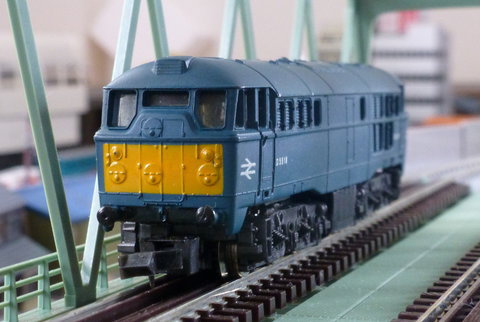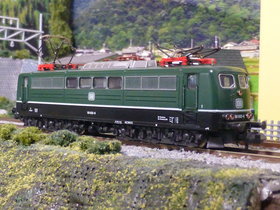Japan Train and Rail BlogA website about trains and model railways and associated subjects in Japan and other countries.
Saturday, June 29, 2019 11:49 AM
It's just been announced that Tomix World, formerly located in Omiya and which closed in early 2019, will be reopening on Saturday July 27th at its new location close to Kanda Station in Tokyo.
The new address is: Kanda IK Building 7F, 2-7-1 Kajimachi, Chiyoda-ku, Tokyo (東京都千代田区鍛冶町2丁目7-1 神田IKビル7F); Google Street View link.
The Tomix World website contains more details (at the time of writing in Japanese only).
Saturday, June 29, 2019 12:28 AM
Flickr album with a bunch of pictures: DB 485 005 bis 885 709
Model by Roco:
Friday, September 7, 2018 10:53 AM
| Class | Wheel arrangement | No. built | Years in operation | Region of operation |
|---|
| ED70 |
Bo-Bo |
19 |
1957 ~ 1975 |
Hokuriku Main Line |
| ED71 |
Bo-Bo |
55 |
1959 ~ 1982 |
Tohoku Main Line |
| ED72 |
Bo-2-Bo |
22 |
1961 ~ 1982 |
Kyushu |
| ED73 |
Bo-Bo |
22 |
1962 ~ 1982 |
Kyushu |
| ED74 |
Bo-Bo |
6 |
1962 ~ 1978 |
Hokuriku Main Line, Kyushu |
| ED75 |
Bo-Bo |
302 |
1963 ~ (present) |
Kyushu, north-east Japan |
| ED76 |
Bo-2-Bo |
139 |
1965 ~ (present) |
Kyushu, Hokkaido |
| ED77 |
Bo-2-Bo |
16 |
1967 ~ 1993 |
Ban'etsu-Nishi line |
| ED78 |
Bo-2-Bo |
14 |
1967 ~ 2000 |
Ōu Main Line |
| ED79 |
Bo-Bo |
34
10 |
1986/87 ~ 2016 [1]
1989 ~ 2016 [2] |
Seikan Tunnel |
[1] date of conversion from ED75
[2] newly constructed batch
Friday, July 13, 2018 4:07 PM
Older Tomix N gauge trains are infamous for their "spring worm" drive mechanism, whereby the motor is connected to the bogie gear tower via a long spring-like metal spiral. While presumably cheap to manufacturer, it does result in somewhat noisy operation, so from the late 1980s (IIRC) Tomix gradually phased this out in favour of a more conventional mechanism with cardan shafts connecting to a worm gear on top of the bogie gear tower. This second generation does however seem to have retained the older electrical pickup mechanism, with copper forms pressing down on the axles inside the wheels (similar to what Lima did, e.g. on the Class 31), which is more reliable than wiper-based pickups but not as elegant as current axle pinpoint pickups.
Anyway, while this second generation of Tomix mechanisms is basically robust and reliable, some can be surprisingly noisy. I'm not sure whether that was the case when they were new, or whether something's deteriorated with age, but certainly annoying on otherwise decent models.
After some investigation it seems a common issue is that the worm gear case is slightly loose and prone to vibrating against the chassis. This can be mitigated by applying strips of electrical tape to hold it in place, as seen here on an older Tomix 115-1000 series:
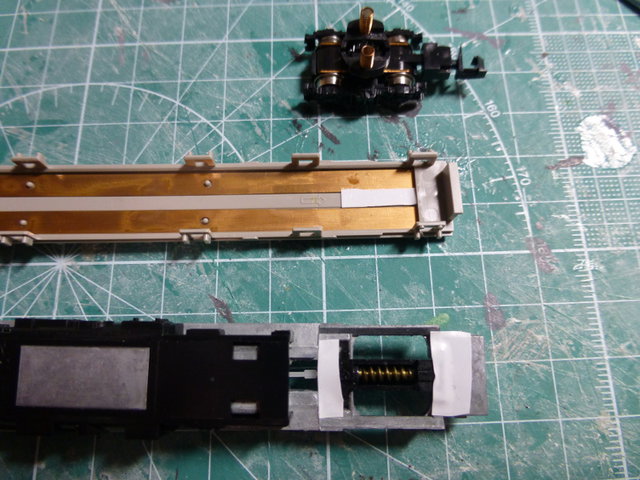
While it doesn't bring the mechanism up to contemporary standards, it does change the running qualities from "annoyingly rattly" to "decent runner".
Tuesday, July 10, 2018 10:45 PM
The bi-monthly magazine "N" (エヌ) by Ikaros Publications has, for the past couple of years (from volume 77 onwards), been publishing a fairly regular feature detailing how to clean up/improve older Japanese N gauge models. This was originally called "ジャンク活用術" (janku katsuyou-jitsu, "Making use of older models") but in recent issues it's been titled "Re Model". (Note: "ジャンク"/junk generally refers to second hand models which are basically not in as-new tip-top condition, typically missing packaging, accessories etc., or have some minor repairable damage; it can refer to genuine spares-or-repairs candidates but 95% ot the time something labelled as "junk" will be perfectly usable).
This is an overview of the available articles for reference; articles from volume 100 and earlier are taken from a listing in that edition which contains an overview of articles in all 100 magazines to date.
| |
Volume |
Page |
Title (original) |
Title (translated |
| * |
108 |
42 |
TOMIX DD51 (旧製品) |
Tomix DD51 (old version) |
| * |
100 |
42 |
TOMIX 113系 |
Tomix 113 series |
| |
99 |
42 |
中村精密 蒸気機関車 |
Nakamura Seimitsu steam locomotive(s) |
| * |
97 |
46 |
しなのマイクロ国鉄事業車編 |
Shinano Micro JNR departmental vehicles |
| * |
96 |
90 |
TOMIX 国鉄キハ02形 |
Tomix JNR Kiha 02 series railcars |
| * |
95 |
52 |
KATO 103系(一般型) |
Kato 103 series (original Kato version) |
| * |
94 |
90 |
KATO 24系寝台特急「あけぼの・日本海」 |
Kato 24 series sleeper "Akebono/Nikonkai" |
| * |
93 |
90 |
宮沢模型 381系パノラマしなの |
Miyazawa Mokei 381 series "Panorama Shinano" |
| * |
92 |
90 |
エンドウ 103系・73系 |
Endou 103 series / 73 series |
| * |
91 |
90 |
KATO 165系 |
Kato 165 Series |
| |
90 |
90 |
マイクロエース 485系 |
MicroAce 485 Series |
| |
89 |
90 |
KATO マイテ49 |
Kato maite 49 (saloon end car) |
| |
88 |
90 |
KATO EF65ゆうゆうサロン |
Kato EF65 "Yuu-yuu Saloon" |
| * |
87 |
90 |
エンドウ都営地下鉄 10-100形 |
Endou Toei Chikatetsu 10-100 Series |
| * |
86 |
90 |
KATO 103系低運転台 |
Kato 103 series (low cab version) |
| |
85 |
90 |
KATO クモニ143 |
Kato kumoni 143 |
| |
84 |
90 |
KATO キハ40・キハ58 |
Kato kiha 40 / kiha 58 |
| |
83 |
90 |
TOMIX サロ481 |
Tomix saro 481 |
| |
82 |
90 |
エンドウ 京王5000系 |
Endou Keio 5000 series |
| |
81 |
88 |
KATO 205系・103系 |
Kato 205 series / 103 series |
| |
80 |
88 |
KATO 189系 |
Kato 189 series |
| |
79 |
88 |
KATO 189系 |
Kato 189 series |
| |
78 |
96 |
KATO コキ10000 |
Kato koki 10000 (container wagon) |
| |
77 |
90 |
宮沢模型 165系「なのはな」 |
Miyazawa Mokei 165 series "Nanohana" |
(volumes denoted with an asterisk are in my personal possession)
Sunday, May 6, 2018 11:43 AM
Back in the increasingly dim and distant (well for me at least) 1980s, when diesels were blue and trains were still done properly (loco at one end hauling coaches or wagons), the Class 27s were very much a far and distant (from my Midlands perspective) Scottish class, rarely if ever sighted.
However as with many of the early "pilot scheme" classes, they started off life elsewhere, with quite a few being allocated to Cricklewood and Leicester during the 1960s. Though I've always been aware of that, they still seemed utterly unconnected with my main region of interest, the West Midlands, until I came across entirely by coinicidence a photograph of one topping the Lickey Bank at the head of a freight train.
Interest piqued, further research revealed more evidence of the class in the Birmingham area (though an awful lot of hits were false positives triggered by the the "B" in "BRCW", not the location of the photograph or sighting) - Quite a few seem to have made it west and south of the city. Following is a list of online references I've found, in rough chronological order.
Also of interest is this thread on RMweb: Leicester class 27's
Monday, April 16, 2018 5:27 PM
One question which frequently comes up in various N scale forums and groups is "is there a list of all N gauge models ever made?"
To which the answer is "no", but there are a number of sites providing comprehensive lists of models for particular manufacturers, subject areas and other information such as scans of old catalogues. This is a (incomplete and work-in-progress) "meta" list of such sites.
Global/multinational lists
British outline models
German outline models
- MoBaDaten.Info - wiki-based database of mostly German models, multiple scales
- Modellbau-Wiki - wiki-based database of mostly German models, multiple scales
- Spurweite-N.de - mainly German models, includes user reviews
- spur-n-datenbank.de - mainly German models, some Spanish/Italian; seems not to be updated much
Japanese outline models
North American outline models
- spookshow.net - North American N scale locomotive, passenger cars and wagons
By manufacturer
Thursday, July 20, 2017 3:15 AM
Reference
Model information
| Scale |
Nominally British N scale (1:148, 9mm gauge / N gauge) |
| Manufacturer |
Lima |
| Running number |
D5518 |
| Catalogue number |
220209G |
| Produced |
n/a |
| Manufacturer page |
n/a |
| LIMA-N scale-LOCOMOTIVES |
220209 ... BR (British) ... D 5518 |
History
The Lima N Gauge Class 31 from the 1980 Lima catalogue.
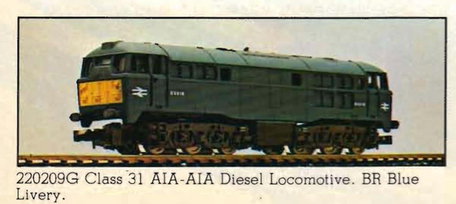
Review
The first and worst rendering in N gauge of the Class 31 (Brush Type 2), an early (and relatively long-lived) modernisation plan diesel with the unique (for the UK) A1A-A1A wheel arrangement.
Inside it's the classic Lima chassis design:
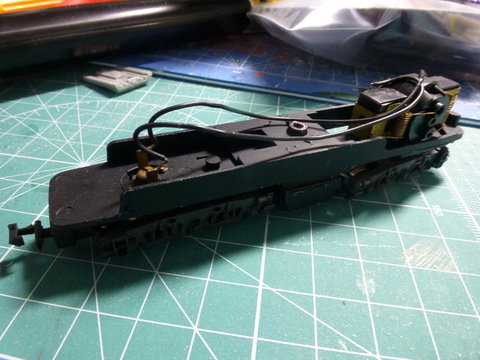
Diecast metal chassis with the motorized bogie on the right, pickup bogie on the left
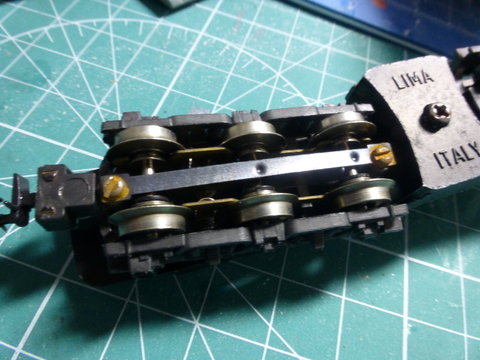
Mmmmh, lovely thick pizza cutter wheels. The pickup arrangements is actually not too bad, with what look like brass pickups pressing down on the axles, and held in place by a small rim on each side. The screw which holds the body in place visible on the right.
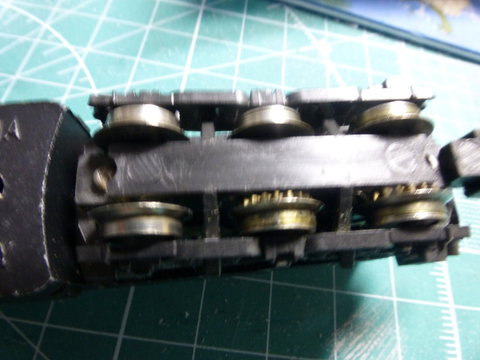
The motorized bogie; the way the motor is mounted seems to make it impractical to power more than two axles.
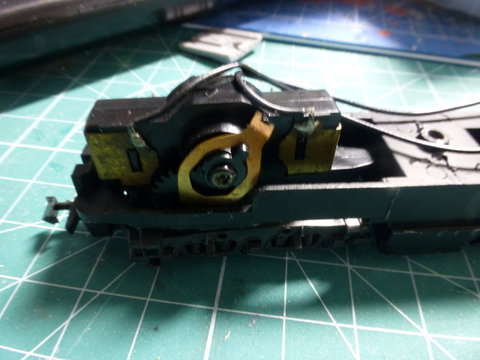
The motor; the brass (?) strips on each end, which the wires are soldered to, reach around the motor block (see next photo). Not entirely sure what the purpose of the oval copper (?) strip in the centre is, it serves no electrical purpose and doesn't hold anything in place.
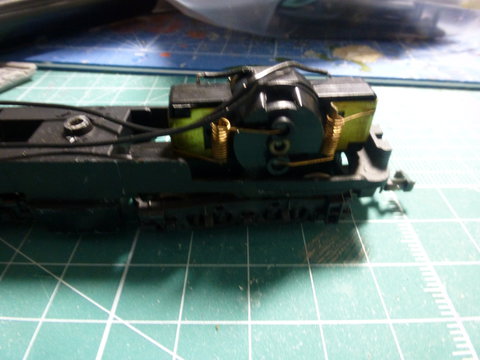
Motor from the other side; the brass strips wrap around from the other side, and hold two copper springs in place, which in turn secure the brushes against the motor and provide electrical contact.
Links
Friday, March 10, 2017 11:26 PM
I recently aqcuired a rake of Kato Taki 1000 oil tank wagons (set 10-1167) to go with my EH-200, and while they're perfectly decent wagons the default Arnold couples really do stand out and look clunkier than usual. Normally I'm not too bothered by Arnold couplings and can "unsee" them, but these had to go - replaced by the Kato coupler (part number 11-707). Mildly fiddly to assemble and put in place, but they make a huge difference:
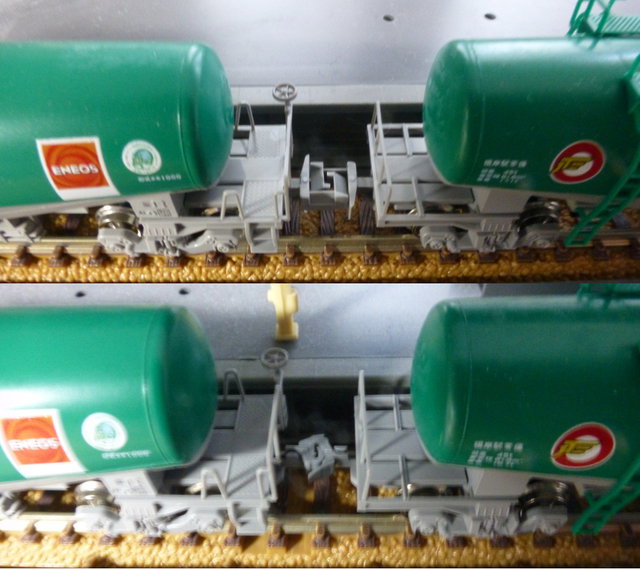
Sunday, March 5, 2017 4:24 AM
As previously mentioned I'm creating a station which is inspired by Berlin's Stadtbahn, and was wondering what models might already have been made of it.
The first obvious candidate is the layout at the former LOXX Berlin, which is centred around a somewhat compressed version of the Stadtbahn roughly between Zoo and Ostkreuz (which is happily captured in its original form). Some pictures in my Flickr album.
Also in Berlin is a model of the Stadtbahn between Marx-Engels-Platz and the former East Berlin Haupthbahnhof (now the Ostbahnhof), which pays particular attention to the tram system (YouTube video of this layout).
A model shop in Weilheim (Upper Bavaria) presented these pictures of a customer's layout (shop sadly now closed and site unavailable, some pages in the Wayback Machine).
A German forum thread with some scratch-built structures: https://www.stummiforum.de/viewtopic.php?t=123403
And from the UK there's this blog with another (evidently never completed) take on the Stadtbahn, and this club layout under active development.
A British-built layout as a freelance depiction of part of Alexanderplatz Station and the Stadtbahn to the west of it: Youtube video (1); Youtube video (2).
Any other links or suggestions welcome.
|
Featured Locomotive
Recent Posts
Model railway content
Stock updates
Links
railsquid's other sites
General Japanese rail
English sites
Japanese sites
Model rail
Japan-related
General
|


